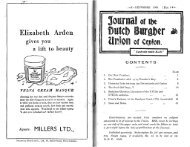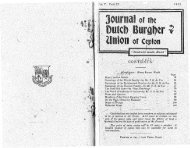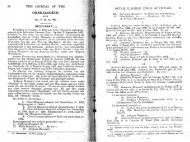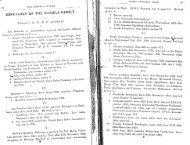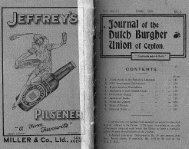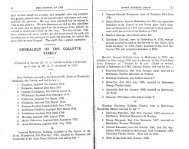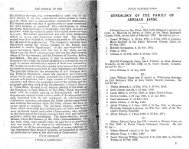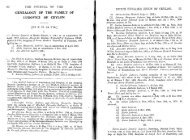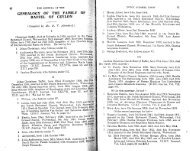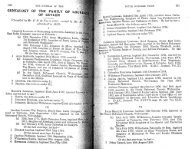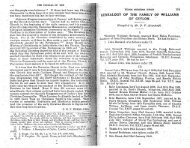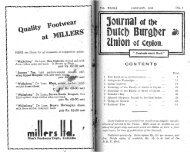Part 1-4 - Dutch Burgher Union of Ceylon
Part 1-4 - Dutch Burgher Union of Ceylon
Part 1-4 - Dutch Burgher Union of Ceylon
You also want an ePaper? Increase the reach of your titles
YUMPU automatically turns print PDFs into web optimized ePapers that Google loves.
The trip to London was in those days as significant to a <strong>Ceylon</strong>ese as a<br />
trip to Mecca might be to a Muslim.<br />
England was the seat <strong>of</strong> the true culture. England was the home <strong>of</strong> the<br />
sweet civilized life where golden portals swung open to intellectual<br />
attainment. But we were 'colonials' and felt we were disadvantaged. Merle<br />
Oberon, the movie actress, always pasted <strong>of</strong>f her Indian or Anglo-Indian<br />
mother as her housekeeper. She knew that to admit to her miscegenation<br />
could seriously impede her ambitions towards a film career. I remember<br />
staying at a lodging house in Gower Street and telling the amiable landlady<br />
that I was from <strong>Ceylon</strong>. 'You must be so happy to have left behind them<br />
savage parts' she remarked consolingly. My gift for repartee for once<br />
remained stifled. The ignorance <strong>of</strong> the average Englishman about his farflung<br />
empire was barely believable. <strong>Ceylon</strong> was carelessly lumped together<br />
with India.<br />
Such shocks were, however, ahead <strong>of</strong> me. I was heavy-hearted at my<br />
parting from my dear friends and adolescent loves, and from the land <strong>of</strong><br />
my forefathers teeming with cherished memories. True to his antecedents<br />
my father had booked on a <strong>Dutch</strong> vessel and as we steamed out <strong>of</strong><br />
Colombo harbour Adam's Peak, sacred to the Buddhists, <strong>of</strong>fered me my<br />
last glimpse <strong>of</strong> the Island <strong>of</strong> <strong>Ceylon</strong>.<br />
A violent storm in the Golfe du Lion kept us from entering Marseilles<br />
harbour. Our train, with sleepers for Paris and Calais, reserved in advance,<br />
had long gone. We were compelled to board a midnight express on which<br />
we shared a compartment with a Baron van Lyndon, a <strong>Dutch</strong> shipboard<br />
companion <strong>of</strong> ours. His command <strong>of</strong> French there and then decided me to<br />
learn that incomprehensible tongue. As our train circled Paris to reach the<br />
Gare du Nord from the Gare de Lyon, I had my first glimpse <strong>of</strong> a Manet<br />
come to life, caft terrasse with tables set put as far as the pavement edge<br />
and waiters in black with white napkins slung over their forearms. I knew<br />
then I would lose no time in visiting Paris.<br />
On the evening <strong>of</strong> 3 April we chugged into Victoria Station in<br />
London. A light snow was falling. We were to stay at Dr Sam Brohier's in<br />
North Finchley and his brother, Annesley, was to take us there from<br />
Victoria. We never spotted him. Delays caused by the storm had badly<br />
disrupted our schedules and misled him. We had seen our first snow on the<br />
Cretan mountaintops but now we were experiencing our first snowfall. We<br />
hired a taxi and as we bowled along through Swiss Cottage huge posters on<br />
the billboards announced Layton and Johnston at the Palladium.<br />
Everywhere in <strong>Ceylon</strong> record players had been sounding the voices <strong>of</strong> these<br />
4<br />
coloured duettists. Instantly 1 made a mental note. To the Palladium to<br />
hear Layton and Johnston in the flesh.<br />
Here was civilization. Layton and Johnston. And more, Cortot at the<br />
Queen's Hall playing Chopin. <strong>Ceylon</strong> may have borne me but already<br />
London had captured me. Once settled my father arranged for me to take a<br />
preparatory course with Billy Hill, tutor to the India Office. Billy Hill had<br />
coached Harold de Soysa who went on to take his degree at Oriel College<br />
at Oxford and became, eventually, Bishop <strong>of</strong> Colombo. I'd been at Oxford<br />
a year when another old Royalist, Derrick de Saram, came up to Keble<br />
College. Neglected for a year, he played for the university cricket team and<br />
scored a century against the touring Australians. He also won a tennis blue<br />
and almost became a triple blue, only just losing a place in the Oxford golf<br />
team.<br />
Derrick de Saram was the first <strong>Ceylon</strong>ese to win a cricket blue at<br />
Oxford or at Cambridge. And, talking <strong>of</strong> cricket it was sport in England<br />
that so caught our fancies. My father had been a Colt, the club which may<br />
be said to have fathered cricket in <strong>Ceylon</strong>. He played along with Tommy<br />
Kelaart, who had once bowled out Dr Grace, Dr Ali Raffel, DrColvin<br />
van Geyzel and others. My father and 1 went first to the Oval to see Surrey<br />
v Yorkshire, a match during which we watched the matchless Jack Hobbs,<br />
the imperious Herbert Sutcliffe and those two chunks <strong>of</strong> Yorkshire<br />
granite, Percy Holmes and Maurice Leyland.<br />
The very next year Frank Gunewardene, President <strong>of</strong> the <strong>Ceylon</strong><br />
Cricket Association, got us tickets for the England-Australia test at Lords.<br />
1930 was an annus mtrabiiis for cricket and, especially, for Australian<br />
cricket. It was Don Bradman's first tour <strong>of</strong> England. Bradman was a<br />
phenomenon. Glance at his recorded accomplishments. He stands far<br />
ahead even <strong>of</strong> such marvellous players as Sobers, Richards, Botham or<br />
Gavaskar. When Sir Douglas Shields operated on Bradman for<br />
appendicitis at his Park Lane nursing home, huge crowds gathered to<br />
await the posting <strong>of</strong> bulletins about his condition, 'just like royalty'. We<br />
shall never look upon his like again.<br />
My father had played cricket for the Colts and he'd played soccer for<br />
the Chums. When the <strong>Ceylon</strong>ese founded a serious base for their rugby<br />
football, theCR & FC, he became one <strong>of</strong> the club's first vice-presidents. In<br />
England we regularly went to Highbury to see Arsenal play. When<br />
England played Italy seven Arsenal players wore England shirts which<br />
proclaims eloquently the quality <strong>of</strong> the Arsenal teams <strong>of</strong> the early thirties.<br />
Nor did we miss Twickenham, the varsity match and the internationals.



